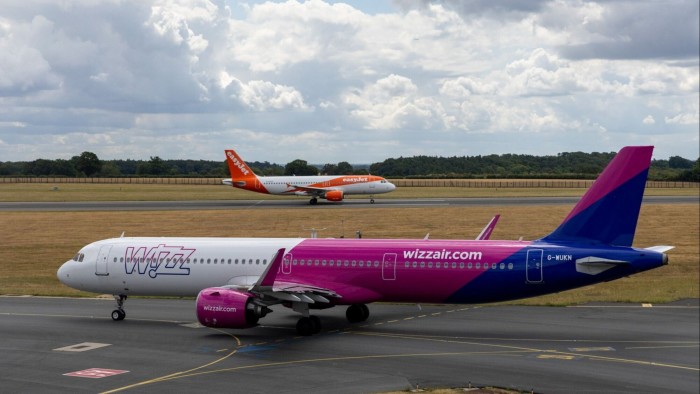Unlock the Editor’s Digest for free
Roula Khalaf, Editor of the FT, selects her favourite stories in this weekly newsletter.
Wizz Air may well be a contender for the unluckiest airline. That is little consolation to the low-cost carrier’s investors, who have seen their once high-flying shares slide for more than four years. Last month, they fell below their 2015 float price. Boss József Váradi has pledged to throttle back on unprofitable growth, but there’s still a climb before regaining a cruising altitude.
Wizz must hope its luck is turning. It reopened aggressively after the Covid-19 pandemic lockdowns, even bidding for rival easyJet. But the Budapest-based carrier’s eastern European focus meant Russia’s 2022 invasion of Ukraine hit it harder than others. It took another blow with the grounding of about a fifth of its fleet since the 2023 discovery of tainted metal problems with some of its Pratt & Whitney engines.
First-quarter results on Thursday showed signs of a recovery, with an 11 per cent rise in passengers carried and revenues up 13 per cent. Váradi declared a focus on profitability over growth at any cost, and also reduced his longtime target for 20 per cent passenger capacity growth per year to 10-12 per cent. That should go some way to assuaging worries that the boss, who co-founded the airline just as the EU expanded to include the former eastern bloc, could not change course.
Turnarounds take time, though, and Wizz also withdrew its full-year guidance. It pointed to discussions with Pratt & Whitney under a new deal that should alleviate its engine shortage, as well as negotiations with Airbus over its orders. Investors can buckle up for at least a few bumpy months ahead.
Even for those happy to believe in the blue skies of 2026, it is worth remembering how Wizz lost so much altitude. It wasn’t just ill fortune; there are questions of judgment too. Its outsize schedule of flights to Tel Aviv has become a pain point as tensions in the region remain high. And last month the airline gave up on a 2019 joint venture in Abu Dhabi, citing a failure to gain sufficient market access — or even to maintain aircraft engines in the harsh climate.
Wizz’s shareholders had high hopes for a recovery. As recently as 2023 they signed off on a £100mn bonus plan for Váradi if an ambitious £120 share price target was met by 2028. That was roughly twice Wizz’s 2021 peak price and six times its 2023 level. The plan has now been amended to include other, performance-based, incentives.
Now Wizz’s shares are down roughly four-fifths from their 2021 peak. Investors are not yet fully convinced by their newly pragmatic and profitabililty-focused airline. Wizz will have to hold the fizz, for now.
